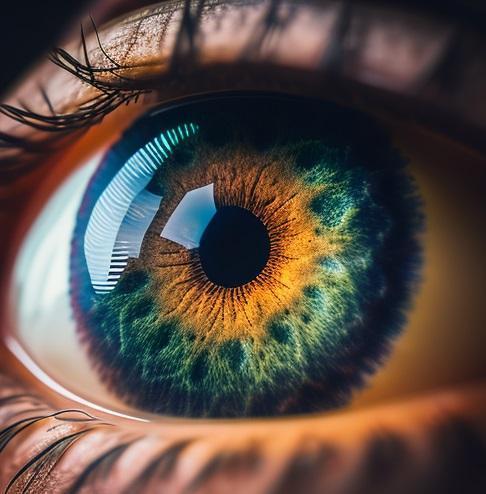As we age, our eyesight can deteriorate, but with proper care, we can keep our eyes healthy and our vision sharp. In this article, I’ll share 10 top eye wellness tips to help you take care of your eyes and maintain good vision.
Tip #1: Eat a well-balanced diet. Eating a well-balanced diet that includes fruits, vegetables, and lean proteins can help to maintain good eye health. Foods rich in antioxidants, such as leafy greens, fish, and nuts, can help to protect the eyes from damage. Antioxidants such as Vitamin A, Vitamin C and Vitamin E, lutein and zeaxanthin are known to protect the eyes from damage caused by free radicals and UV rays. These nutrients help to reduce the risk of age-related macular degeneration and cataracts. Eating a well-balanced diet can provide your eyes with the essential nutrients they need to function properly and maintain good vision.
Tip #2: Wear sunglasses. Wearing sunglasses that block both UV-A and UV-B rays can help to protect the eyes from sun damage. This can decrease the risk of cataracts and age-related macular degeneration. UV rays can damage the retina, cornea, and lens of the eye, leading to serious eye problems. Wearing sunglasses with UV protection can help to reduce the risk of eye damage caused by the sun. It’s also important to wear sunglasses when spending time outdoors, even on cloudy days, as UV rays can penetrate through clouds. Make sure to choose sunglasses that block at least 99% of UV-A and UV-B rays for the best protection.
Tip #3: Quit smoking. Smoking can lead to an increased risk of cataracts and age-related macular degeneration. Quitting smoking can help to reduce the risk of these conditions. Smoking causes a number of health problems, including an increased risk of eye problems. The chemicals in cigarette smoke can damage the blood vessels in the eyes, leading to eye diseases such as cataracts, age-related macular degeneration, and diabetic retinopathy. By quitting smoking, you can reduce the risk of these conditions and improve the overall health of your eyes.
Tip #4: Get regular eye exams. Getting regular eye exams can help to detect and treat any eye problems early. It is recommended to have an eye exam at least once a year. Eye exams are an important part of maintaining good eye health, as many eye problems have no noticeable symptoms in the early stages. During an eye exam, your eye doctor will check your vision, eye health, and check for any signs of eye disease. Early detection and treatment of eye problems can help to prevent vision loss.
Tip #5: Exercise regularly. Exercising regularly can help to improve circulation and reduce the risk of certain eye conditions such as glaucoma. Regular exercise improves blood flow throughout the body, including the eyes, which can help to reduce the risk of eye problems. Exercise can also help to reduce the risk of chronic health conditions such as diabetes and high blood pressure, which can affect the health of the eyes. It can also help to reduce the risk of glaucoma, a condition in which the pressure inside the eye becomes too high, damaging the optic nerve. Regular exercise can also help to improve overall health and reduce stress, which can also have a positive impact on eye health.
Tip #6: Take frequent breaks. If you spend a lot of time looking at a computer or other digital screens, it is important to take frequent breaks. This can help to reduce eye strain and fatigue. Prolonged staring at screens can cause eye strain, fatigue, dry eyes, and headaches. Taking regular breaks and looking away from the screen can help to reduce these symptoms and prevent long-term damage. It is recommended to take a break every 20 minutes, and to look at something 20 feet away for 20 seconds. This technique is known as the 20-20-20 rule.
Tip #7: Use artificial tears. If you experience dry eyes, using artificial tears can help to lubricate the eyes and reduce dryness and discomfort. Dry eyes can occur as a result of environmental factors such as dry air, wind, and pollution, or due to certain medical conditions or medications. Artificial tears can help to lubricate the eyes and reduce dryness and discomfort. They can also help to flush out any foreign particles that may be causing irritation.
Tip #8: Use safety eyewear. If you work in a job that exposes you to potential eye hazards, it is important to wear safety eyewear. This can help to protect your eyes from injury. Safety eyewear can include goggles, safety glasses, or face shields. They are designed to protect the eyes from debris, chemicals, or other hazards that may be present in the workplace. Wearing safety eyewear can help to prevent eye injuries and protect your eyes from damage.
Tip #9: Get enough sleep. Getting enough sleep is important for overall health, including eye health. Lack of sleep can lead to dry eyes, eye strain and fatigue. Sleep is essential for the body to repair and regenerate, including the eyes. A lack of sleep can lead to dry eyes, eye strain, and fatigue, which can affect vision and cause eye discomfort. Aim for at least 7 hours of sleep a night to help keep your eyes healthy and improve vision.
Tip #10: Manage chronic health conditions. Chronic health conditions such as diabetes, high blood pressure, and autoimmune diseases can affect the health of your eyes. Managing these conditions through a healthy lifestyle and medication can help to reduce the risk of eye problems. Chronic health conditions such as diabetes can affect the blood vessels in the eyes, leading to eye diseases such as diabetic retinopathy. High blood pressure can also increase the risk of eye problems such as glaucoma and age-related macular degeneration. Managing these conditions can help to reduce the risk of eye problems and protect the health of your eyes. This includes following a healthy diet, exercising regularly, and taking medication as prescribed. It’s also important to have regular check-ups with your primary care physician to monitor your chronic health conditions and address any issues that may arise.
In conclusion, taking care of your eyes and maintaining good eye health is essential for maintaining good vision and overall health. By following these top 10 eye wellness tips, you can help to protect your eyes from damage, reduce the risk of eye problems, and maintain good vision. Remember that regular eye exams, a healthy lifestyle, and proper protection are key to keeping your eyes healthy. If you notice any changes in your vision or eye health, it’s important to consult an eye doctor as soon as possible. With the right care, you can keep your eyes healthy and enjoy clear vision for years to come.


